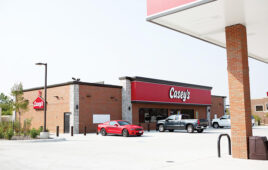 National competition honors science teachers for developing innovative approaches to quality lab experiences with limited school resources.
National competition honors science teachers for developing innovative approaches to quality lab experiences with limited school resources.
Shell Oil Co. and the National Science Teachers Association announced the grand prize winner and four national finalists in the third annual Shell Science Lab Challenge.
The competition encouraged teachers (grades 6-12) in the U.S. and Canada, who have found innovative ways to deliver quality lab experiences with limited school and laboratory resources, to share their approaches for a chance to win a school science lab makeover valued at $20,000.
“Inquiry-based learning and hands-on experimentation are key elements for encouraging student interest in science,” said Dr. Frazier Wilson, vice president, Shell Oil Co. Foundation, manager, social investment. “The Shell Science Lab Challenge strives to support inquiry-based instructional practices of our science teachers and excite students about the wonders and possibilities of science through active learning that emphasizes questioning, data analysis, and critical thinking. Exemplary science teaching is more relevant when it occurs in a quality lab environment where science concepts can be explored by students.”
“These science teachers have implemented some remarkable science programs, providing quality lab experiences for their students with few resources,” said Dr. David Evans, executive director, NSTA. “We commend the winner and national finalists of the Shell Science Lab Challenge for their creativity, resourcefulness and commitment to their students.”
To enter the Shell Science Lab Challenge, science teachers of grades 6-12 in the U.S. and Canada were asked to describe their school’s current laboratory resources, explain why the school’s laboratory facilities might be classified as “limited” resources, and describe their approach to science education instruction utilizing their school’s current lab facilities. A panel of science educators then reviewed and selected the top entries.
Grand Prize Winner: Merrie Rampy, Highland High School, Craigmont, Idaho
Rampy’s principal noted she has seen her “take our basic middle and high school science program and change it to a rigorous and exciting place for students to learn about all of the possibilities science has to offer…Other teachers have observed her excitement about her subject area and the improvements she wanted to bring to her program, and in turn, improve their own programs. Our high school has moved from ‘let’s get these students to graduate’ to ‘let’s ensure all of our students can reach their educational and life goals, including attending a four-year college…’ Our students believe it is cool to be a science nerd.”
The only thing holding Rampy back from having an exceptional program is the antiquated science lab in her rural school. The lack of funding for quality equipment and materials has prevented students from experiencing the sophisticated labs that would prepare them for scientific careers. Despite the limitations, Rampy continues to provide high-quality learning experiences for her students.
National Finalist: Joyce Corriere and Elizabeth Ciancio, Hampton High School, Hampton, Va.
As the oldest of four high schools in the area, Hampton High School’s science classrooms have not been renovated for several years and lack many essentials. The classrooms have no working safety shower or eyewash station for the chemistry classes, for example, and lack sufficient chemicals. With a budget of only $300 per teacher per year that must pay for equipment for three science classes, Corriere and Ciancio must seek creative ways to meet their students’ needs. So their students use a virtual online lab bench to test their experiments.
Corriere and Ciancio would like to have the chemistry classrooms fully renovated to support not only lab safety, but also more effective teaching for all, focused on inquiry, collaboration, and project-based learning. Their vision is to integrate science, technology, engineering, and mathematics (STEM) and to have students work in teams on challenging experiments.
National Finalist: Sally Austin Hundley, Bethel Middle School, Waynesville, N.C.
It is beyond the measure and scope of the budget of Hundley’s small, rural school to overhaul the science lab’s facilities, and the surrounding rural area does not provide students with cultural opportunities for enrichment. Despite this, Hundley has persevered in bringing grant funding to her school and has created courses at each grade level that magnify student interest in, understanding of, and selection of STEM courses in the future. She uses best practices and strategies such as teaming and student-centered learning, which have enabled her students to succeed at projects—such as creating and programming robots—that would typically require many more resources. Allowing students to bring their own devices to class lets them create the methodology for their lab, and results in better understanding of the data created.
National Finalist: Cathleen Tinder, Sebastian Charter Junior High, Sebastian, Fla.
Tinder, who also is a Lockheed Martin-NSTA Fellow in the NSTA New Science Teacher Academy this year, conducts an activities-based program without a science lab. She functions with minimal classroom space on regular student desks to do experiments with limited and outdated resources, and sometimes has had to move her classes to the school cafeteria to have access to a working sink and sufficient room to do lab stations. Due to staff and student expansion, even that opportunity will no longer be an option.
Despite this, Tinder continually seeks integration of inquiry, STEM, and real-world applications of science in the classroom through professional development and collaboration with colleagues. Tinder also takes advantage of online resources whenever possible. As a result of her efforts, her students have continued to thrive and some have even gone on to win regional and state awards at science fairs.
National Finalist: Rachel Willcutts, IDEA Frontier College Prep, Brownsville, Texas
At Willcutts’ school, middle level science teachers teach in portables and have no lab facilities. They push desks together to form tables when conducting experiments. They have no running water, no place to store equipment, and no equipment of their own. Materials and equipment are scarce, and they barely have enough glassware for one class. Advanced placement science classes are especially difficult to teach under these conditions.
Because Willcutts and her colleagues believe access to high-quality science educational experiences help prepare students for 21st-century scientific careers—which in turn helps the entire Rio Grande Valley, a community desperately in need of more STEM professionals—teachers make do with what they have and incorporate inquiry-based, student-directed labs into their curriculum.
As the grand prize winner, Rampy will receive a science lab makeover support package for her school valued at $20,000. The prize package includes an $8,000 Shell cash grant, $8,000 in donated lab equipment, $1,000 in NSTA prizes—to include an NSTA bookstore gift certificate and NSTA conference registrations, NSTA memberships and NSTA Learning Center subscriptions for two teachers—and an expense-paid trip for two teachers to attend the 2013 NSTA National Conference on Science Education in San Antonio next month.
The four national finalists will each receive a science lab makeover support package for their school valued at $8,500. The prize package includes a $3,000 Shell cash grant, $3,000 in donated lab equipment, $1,000 in NSTA prizes—
to include an NSTA bookstore gift certificate and NSTA conference registrations, NSTA memberships and NSTA Learning Center subscriptions for two teachers—and an expense-paid trip for one teacher to attend the 2013 NSTA National Conference on Science Education in San Antonio.
Ward’s Science is also supporting the Shell Science Lab Challenge by providing equipment to the winners.
Recognizing that the laboratory experience is integral to science education and that many schools, especially schools in urban and rural areas, do not have the resources to invest in quality lab equipment, NSTA and Shell partnered on the Shell Science Lab Challenge to bring much needed lab materials and resources to school districts nationwide and in Canada.




